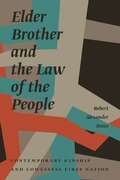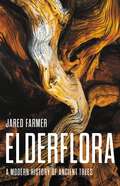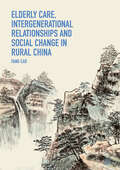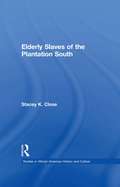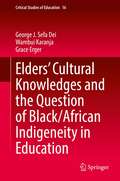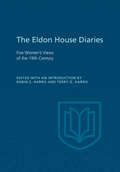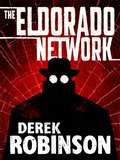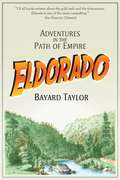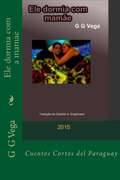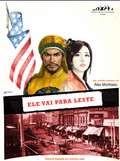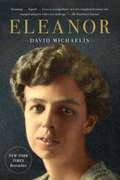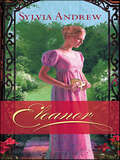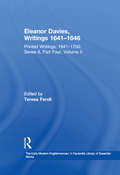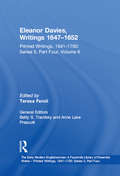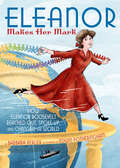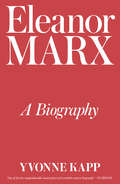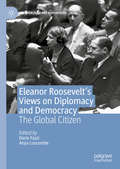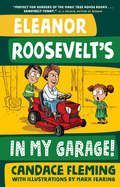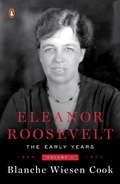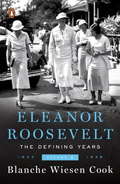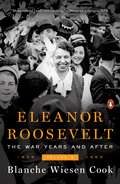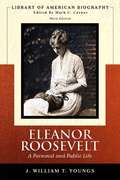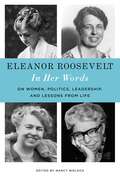- Table View
- List View
Elder Brother and the Law of the People: Contemporary Kinship and Cowessess First Nation
by Robert Alexander InnesIn the pre-reserve era, Aboriginal bands in the northern plains were relatively small multicultural communities that actively maintained fluid and inclusive membership through traditional kinship practices. These practices were governed by the Law of the People as described in the traditional stories of Wîsashkêcâhk, or Elder Brother, that outlined social interaction, marriage, adoption, and kinship roles and responsibilities.In Elder Brother and the Law of the People, Robert Innes offers a detailed analysis of the role of Elder Brother stories in historical and contemporary kinship practices in Cowessess First Nation, located in southeastern Saskatchewan. He reveals how these tradition-inspired practices act to undermine legal and scholarly definitions of “Indian” and counter the perception that First Nations people have internalized such classifications. He presents Cowessess’s successful negotiation of the 1996 Treaty Land Agreement and their high inclusion rate of new “Bill-C31s” as evidence of the persistence of historical kinship values and their continuing role as the central unifying factor for band membership.Elder Brother and the Law of the People presents an entirely new way of viewing Aboriginal cultural identity on the northern plains.
Elderflora: A Modern History of Ancient Trees
by Jared FarmerThe epic story of the planet&’s oldest trees and the making of the modern world Humans have always revered long-lived trees. But as historian Jared Farmer reveals in Elderflora, our veneration took a modern turn in the eighteenth century, when naturalists embarked on a quest to locate and precisely date the oldest living things on earth. The new science of tree time prompted travelers to visit ancient specimens and conservationists to protect sacred groves. Exploitation accompanied sanctification, as old-growth forests succumbed to imperial expansion and the industrial revolution. Taking us from Lebanon to New Zealand to California, Farmer surveys the complex history of the world&’s oldest trees, including voices of Indigenous peoples, religious figures, and contemporary scientists who study elderflora in crisis. In a changing climate, a long future is still possible, Farmer shows, but only if we give care to young things that might grow old.Winner of the 2023 Jacques Barzun Prize in Cultural History
Elderly Care, Intergenerational Relationships and Social Change in Rural China
by Fang CaoThis book investigates how rapid socio-political-economic change in China since 1949 has affected intergenerational relationships and practices in rural areas, specifically the care provided to elderly parents by their adult children. It focuses on the lived experiences of rural villagers and their perceptions of the impact of these socio-political changes on intergenerational relationships, care of the elderly, family cohesion, and the traditional value of filial piety. It notably considers the importance of filial piety as a dominant family value, the conflict between strong family bonds and growing desires for individuality and autonomy, the prevalence of migrant work among adult children and the diversification of intergenerational practices, alongside the need for national policy and services development for residential and community-based aged care in rural China.
Elderly Slaves of the Plantation South (Studies in African American History and Culture)
by Stacey K. CloseFirst published in 1997. Routledge is an imprint of Taylor & Francis, an informa company.
Elders’ Cultural Knowledges and the Question of Black/ African Indigeneity in Education (Critical Studies of Education #16)
by George J. Dei Wambui Karanja Grace ErgerThis book makes a strong case for the inclusion of Indigenous Elders’ cultural knowledge in the delivery of inclusive education for learners who are members of minority communities. It is relevant to curriculum developers, teachers, policy makers and institutions that engage in the education of Black, Indigenous, Latinx and other minority students. This book provides opportunities for exploring the decolonization of educational approaches. It promotes the synthesis of multiple types of knowledge and ways of knowing by making a case for the incorporation of Indigenous knowledges and Indigenous Elders as teachers in learning spaces. The book is of interest to educators, students, and researchers of Indigenous knowledge and decolonizing education. Additionally, it is important for educational policy makers, especially those engaged in looking for strategic solutions to bridging educational disparities and gaps for Indigenous, Black, Latinx and other minority learners.
Eldon House Diaries: Five Women's Views of the 19th Century
by Robin Harris Terry HarrisEldon House is a distinctive element in the historical townscape of London, Ontario. By the mid-nineteenth century, its original owners, John and Amelia Harris, were prominent members of society in that dynamic community. Their children grew up in the affluent and cultured setting of a family whose increasing prosperity advanced with that of London and western Ontario. If London had an elite, the Harris family was part of it, and Eldon House was an important focal point of the social regimen of the day. A considerable corpus of family papers within the Eldon House and prominent among these papers is a collection of diaries that are excerpted in this volume, encapsulating the personalities, activities, and voices of the Harrises of London. These diaries are valuable because of the details of the warp and woof of daily life in the nineteenth century. But, more importantly, they are women's diaries. As such, they speak to us of the verities of personal, domestic, and societal life in the neglected voice of women. Together, they provide a fascinating perspective of these women's lives in, around, and beyond Eldon House.
Eldorado Network
by Derek Robinson1941. Hitler rampant. Spain neutral. Madrid, like Casablanca, the launching pad for spies from all sides. The most daring and audacious is codenamed 'Eldorado'. Young, inexperienced, hotheaded, he had no right to survive, let alone succeed. Now his network is the most valuable in Europe, and the fates of armies lie in his hands.But who does he work for? Or is he only in it for himself? One thing's for sure. War may be a dirty business, but it certainly brings home the bacon. Based on a true story, The Eldorado Network is the first novel in Derek Robinson's acclaimed Luis Cabrillo Quartet. A tense and gripping espionage thriller from a master of action and suspense.
Eldorado Network
by Derek Robinson1941. Hitler rampant. Spain neutral. Madrid, like Casablanca, the launching pad for spies from all sides. The most daring and audacious is codenamed 'Eldorado'. Young, inexperienced, hotheaded, he had no right to survive, let alone succeed. Now his network is the most valuable in Europe, and the fates of armies lie in his hands.But who does he work for? Or is he only in it for himself? One thing's for sure. War may be a dirty business, but it certainly brings home the bacon. Based on a true story, The Eldorado Network is the first novel in Derek Robinson's acclaimed Luis Cabrillo Quartet. A tense and gripping espionage thriller from a master of action and suspense.
Eldorado: Adventures in the Path of Empire (Notable American Authors)
by Bayard TaylorA journalist's eyewitness account of the explosive 1849 California gold rush and his travels through Mexico. In 1849, a young, wide-eyed reporter from New York ventured West not to seek riches, but to report on the madness and exuberance of the California gold rush. Sent by Horace Greeley, a highly respected New-York Tribune editor, twenty-four-year-old Bayard Taylor traveled through Panama to reach his final destination, San Francisco, which he described as an "amphitheatre of fire" in the night, gleaming with the promise of gold and progress.In his enthralling and robust narrative, Bayard brings the reader into the wild, lush world of early California, reporting on the nearly overnight growth of townships and infrastructure after the gold rush. During his adventures, Bayard walked one hundred miles from San Francisco to Monterey, and later returned to New York via Mexico by foot, mule, and coach. Bayard describes the characters he met with an honest curiosity--heady gold miners who had once been doctors and lawyers, hospitable Mexicans from all classes of society, and even a highway robber who made off with his books.Eldorado, which borrows its title from the South American-Spanish legend of a hidden land of gold, is a magnificent tale about the birth of California from a deserted land to a modern city sprawl. At once an account of history and of one man's thrilling adventures, Eldorado transports the reader to the beginning of an era, with all its gold, glitz, and glamour.
Ele dormia com a mamãe
by G G Vega Caroline Andreia EngelmannÉ uma história sobre uma região de duras histórias bélicas no passado do meu país, lugar onde nascí, e o livro se trata sobre as recordações de uma etapa muito importante da minha família, naquele inóspito lugar da América do Sul.
Ele vai Para leste
by Alex MontrasioUm episódio trágico da imigração chinesa na América serve de premissa para narrar a epopeia de uma família recorrendo a um século de história chinesa e americana. Neste breve conto, vão conhecer um rapaz torna-se órfão desde criança, um velho que convive com um segredo de uma vida, uma princesa lindíssima e um mistério que devagarinho vai se desvendar através da explicação imediata dos protagonistas.
Eleanor
by David MichaelisPrizewinning bestselling author David Michaelis presents a breakthrough portrait of Eleanor Roosevelt, America’s longest-serving First Lady, an avatar of democracy whose ever-expanding agency as diplomat, activist, and humanitarian made her one of the world’s most widely admired and influential women. In the first single-volume cradle-to-grave portrait in six decades, acclaimed biographer David Michaelis delivers a stunning account of Eleanor Roosevelt’s remarkable life of transformation. An orphaned niece of President Theodore Roosevelt, she converted her Gilded Age childhood of denial and secrecy into an irreconcilable marriage with her ambitious fifth cousin Franklin. <P><P>Despite their inability to make each other happy, Franklin Roosevelt transformed Eleanor from a settlement house volunteer on New York’s Lower East Side into a matching partner in New York’s most important power couple in a generation. When Eleanor discovered Franklin’s betrayal with her younger, prettier social secretary, Lucy Mercer, she offered a divorce and vowed to face herself honestly. Here is an Eleanor both more vulnerable and more aggressive, more psychologically aware and sexually adaptable than we knew. She came to accept FDR’s bond with his executive assistant, Missy LeHand; she allowed her children to live their own lives, as she never could; and she explored her sexual attraction to women, among them a star female reporter on FDR’s first presidential campaign, and younger men. Eleanor needed emotional connection. She pursued deeper relationships wherever she could find them. Throughout her life and travels, there was always another person or place she wanted to heal. <P><P>As FDR struggled to recover from polio, Eleanor became a voice for the voiceless, her husband’s proxy in presidential ambition, and then the people’s proxy in the White House. Later, she would be the architect of international human rights and world citizen of the Atomic Age, urging Americans to cope with the anxiety of global annihilation by cultivating a “world mind.” She insisted that we cannot live for ourselves alone but must learn to live together or we will die together. Drawing on new research, Michaelis’s riveting portrait is not just a comprehensive biography of a major American figure, but the story of an American ideal: how our freedom is always a choice. Eleanor rediscovers a model of what is noble and evergreen in the American character, a model we need today more than ever. <P><P><b>A New York Times Bestseller</b>
Eleanor (Legacy of Love)
by Sylvia AndrewMiss Eleanor Southeran was reliably informed that independence of mind was not a desirable quality in a young lady. But, convinced that she could not love any of the fashionable fribbles of the Ton, Eleanor had so far evaded matrimony.Meeting Mr. Jonas Guthrie, a forthright, coolly cynical gentleman, was a refreshing change-until the scandal that surrounded his name was revealed. Believing herself deceived about his character, Eleanor intended never to see him again. But Jonas had other plans for her....
Eleanor Davies, Writings 1641–1646: Printed Writings, 1641–1700: Series II, Part Four, Volume 5 (The Early Modern Englishwoman: A Facsimile Library of Essential Works & Printed Writings, 1641-1700: Series II, Part Four)
by Teresa FeroliIn 1625 Lady Eleanor Davies' life took a dramatic turn when, by her account in 1641, a "Heavenly voice" told her "There is Ninteene yeares and a halfe to the day of Judgement, and you as the meek Virgin". That same year she published her first treatise, A Warning to the Dragon, initiating her controversial career as a writer of prophetic tracts. Between 1641 and 1652 she would produce some 66 of them, using the Bible to gauge the cosmic significance of events, great and small, taking place in her nation and in her personal life. They focus on a complex of personal and political events that Lady Eleanor thought indicated the fast approach of the "last days" foretold by the biblical prophets Daniel and John of Patmos. A complement to Teresa Feroli's facsimile edition of Eleanor Davies' pre-1640 texts (Ashgate, 2000), this pair of volumes reproduces 60 texts from the corpus of 66 printed between 1641 and 1652.
Eleanor Davies, Writings 1647–1652: Printed Writings, 1641–1700: Series II, Part Four, Volume 6 (The Early Modern Englishwoman: A Facsimile Library of Essential Works & Printed Writings, 1641-1700: Series II, Part Four)
by Teresa FeroliIn 1625 Lady Eleanor Davies' life took a dramatic turn when, by her account in 1641, a "Heavenly voice" told her "There is Ninteene yeares and a halfe to the day of Judgement, and you as the meek Virgin". That same year she published her first treatise, A Warning to the Dragon, initiating her controversial career as a writer of prophetic tracts. Between 1641 and 1652 she would produce some 66 of them, using the Bible to gauge the cosmic significance of events, great and small, taking place in her nation and in her personal life. They focus on a complex of personal and political events that Lady Eleanor thought indicated the fast approach of the "last days" foretold by the biblical prophets Daniel and John of Patmos. A complement to Teresa Feroli's facsimile edition of Eleanor Davies' pre-1640 texts (Ashgate, 2000), this pair of volumes reproduces 60 texts from the corpus of 66 printed between 1641 and 1652.
Eleanor Makes Her Mark
by Barbara KerleyAn inspiring true story about modeling good leadership and being the change you wish to see."A compelling celebration of Eleanor Roosevelt that will inspire children to follow in her footsteps." -- Kirkus Reviews"A necessary source of inspiration." -- School Library JournalAll her life, Eleanor Roosevelt hoped to "leave some mark upon the world."She was a shy child who found joy in helping others.A passionate young adult who longed for adventure.An independent young woman who formed her own opinions.A trustworthy partner who worked tirelessly for change.So when her husband became president and she became first lady, Eleanor was ready to make her mark. With characteristic candor, compassion, and courage, she traversed the country and trotted the globe, championing the value and dignity of every human being and transforming the role of first lady. This graceful portrait of a vivacious American icon radiates the essence of Eleanor, a model for kindness and purpose, in her time and in ours.How will you leave your mark upon the world?
Eleanor Marx: A Biography
by Yvonne KappNew edition of Yvonne Kapp's much-celebrated biographyEleanor Marx is one of the most tragically overlooked feminists intellectuals in history. To the extent that she is known, interest in her is often limited to her proximity to Karl Marx, her father. But not only did she edit, translate, transcribe and collaborate with him, she also spent her extraordinary life putting his ideas into practice as a labour organizer and radical. This highly acclaimed biography brilliantly succeeds in capturing Eleanor's spirit, from a lively child, opining on the world's affairs, to the new woman, aspiring to the stage, earning her living as a free intellectual, and helping to lead England's unskilled workers at the height of the new unionism; being always more than, yet at the same time inescapably, Karl Marx's daughter. It is also, inevitably, an unrivalled biography of the Marx household in Victorian London, of the Marx circle, and of Friedrich Engels, the family's extraordinary mentor.Eleanor's biography appeared first at the height of feminist organizing, and does so again in this single-volume edition as the interest in feminism resurges, as a crucial corrective to a narrative that puts feminists and marxists on opposing sides of radical history.
Eleanor Roosevelt and Adlai Stevenson
by Richard HenryThe mutually energizing and often volatile friendship between Eleanor Roosevelt and Adlai Stevenson - unexplored in depth by scholars until this study - was one of the last century s remarkable political alliances. Both Stevenson and Eleanor Roosevelt shared a view of politics as a moral enterprise, one in which the fulfillment of its "mission" was the betterment of the human condition. This belief was the foundation upon which their legislative initiatives were constructed. Employing letters and diaries as well as contemporary media accounts, this book examines the perspectives, the convictions, the style, and the spirit that both principals brought to the calling of public service.
Eleanor Roosevelt's Views on Diplomacy and Democracy: The Global Citizen (The World of the Roosevelts)
by Dario Fazzi Anya Luscombe"This volume fills a void in current studies of Eleanor Roosevelt. Offering a comprehensive analysis of Roosevelt as a diplomat during the Cold War era, it is particularly insightful in analyzing her position on United States race relations while at the United Nations. It provides a new look at Roosevelt’s leadership from an American perspective played out on a global stage."- Maurine H. Beasley, Professor Emerita, University of Maryland College Park, USA"My grandmother was an ardent "small-d" democrat, as well as a Democrat - but she didn't think we were very mature in our living of it! This well-written and illuminating collection of essays, focused on what ER thought it meant to be a global citizen, offers a unique perspective of her views on a host of issues. Let us hope these fresh insights can inspire young people today to construct that better world to which she dedicated much of her life."- Anna Eleanor RooseveltThis book focuses on Eleanor Roosevelt’s multifaceted agenda for the world. It highlights her advocacy of human rights, multilateral diplomacy, and transnationalism, and it emphasizes her challenge to gendered norms and racial relations. The essays of this collection describe Eleanor Roosevelt as a public intellectual, a politician, a public diplomat, and an activist. She was, undeniably, one of the protagonists of the twentieth century and a proactive interpreter of the many changes it brought about. She went through two world wars, the harshness of the Great Depression, and the emergence of nuclear confrontation, and she deciphered such crises as the product of misleading nationalism and egoism. Against them, she offered her commitment to people’s education as an example of civic engagement, which she considered necessary for the functioning of any democratic order. Such was the world Eleanor Roosevelt envisioned and tried to build – symbolically and practically – one where people, the citizens of the world, may really be at the center of international affairs.
Eleanor Roosevelt's in My Garage! (History Pals)
by Candace Fleming Mark FearingIn this hilarious follow-up to BEN FRANKLIN'S IN MY BATHROOM!, history and hijinks collide once more when Eleanor Roosevelt accidentally time travels to a ten-year-old's home in 21st-century America!When Eleanor Roosevelt time travels to Nolan and Olive's house in modern-day Illinois, the kids don't know who she is at first. After all, she's old and wearing a hairnet. But the First Lady of the United States--some 80 years ago, that is-- isn't a mystery for long when she starts spouting things like "You must do the things you think you cannot do." Fresh off a visit from Ben Franklin, Nolan and Olive know what they're in for with this latest guest: an adventure. From drawing on ideals of civil protest to save the town park, to (almost) doing a loop-de-loop in a single-engine plane, to avoiding that know-it-all snoop Tommy Tuttle, there's one laugh after the next in this second book in the History Pals series. Fun back matter expands the story and unpacks the amazing life of Eleanor Roosevelt.
Eleanor Roosevelt, Volume 1: The Early Years, 1884-1933
by Blanche Wiesen CookThe central volume in the definitive biography of America's most important First Lady. "Engrossing" (Boston Globe).Eleanor Roosevelt: Volume Three, 1938-1962, will be published in November. Volume Two covers tumultuous era of the Great Depression, the New Deal, and the gathering storms of World War II, the years of the Roosevelts' greatest challenges and finest achievements. In her remarkably engaging narrative, Cook gives us the complete Eleanor Roosevelt-- an adventurous, romantic woman, a devoted wife and mother, and a visionary policymaker and social activist who often took unpopular stands, counter to her husband's policies, especially on issues such as racial justice and women's rights. A biography of scholarship and daring, it is a book for all readers of American history.From the Trade Paperback edition.
Eleanor Roosevelt, Volume 2: The Defining Years, 1933-1938
by Blanche Wiesen CookThe central volume in the definitive biography of America's most important First Lady. "Engrossing" (Boston Globe).Eleanor Roosevelt: Volume Three, 1938-1962, will be published in November. Volume Two covers tumultuous era of the Great Depression, the New Deal, and the gathering storms of World War II, the years of the Roosevelts' greatest challenges and finest achievements. In her remarkably engaging narrative, Cook gives us the complete Eleanor Roosevelt-- an adventurous, romantic woman, a devoted wife and mother, and a visionary policymaker and social activist who often took unpopular stands, counter to her husband's policies, especially on issues such as racial justice and women's rights. A biography of scholarship and daring, it is a book for all readers of American history.From the Trade Paperback edition.
Eleanor Roosevelt, Volume 3: The War Years and After, 1939-1962
by Blanche Wiesen Cook"Outstanding... A winning concluding volume in a series that does for Eleanor Roosevelt what Robert Caro has done for Lyndon Johnson." -Kirkus Reviews, Starred ReviewThe final volume in the definitive biography of America's greatest first lady.Historians, politicians, critics, and readers everywhere have praised Blanche Wiesen Cook's biography of Eleanor Roosevelt as the essential portrait of a woman who towers over the twentieth century. The third and final volume takes us through World War II, FDR's death, the founding of the UN, and Eleanor Roosevelt's death in 1962. It follows the arc of war and the evolution of a marriage, as the first lady realized the cost of maintaining her principles even as the country and her husband were not prepared to adopt them. Eleanor Roosevelt continued to struggle for her core issues--economic security, New Deal reforms, racial equality, and rescue--when they were sidelined by FDR while he marshaled the country through war. The chasm between Eleanor and Franklin grew, and the strains on their relationship were as political as they were personal. She also had to negotiate the fractures in the close circle of influential women around her at Val-Kill, but through it she gained confidence in her own vision, even when forced to amend her agenda when her beliefs clashed with government policies on such issues as neutrality, refugees, and eventually the threat of communism. These years--the war years--made Eleanor Roosevelt the woman she became: leader, visionary, guiding light. FDR's death in 1945 changed her world, but she was far from finished, returning to the spotlight as a crucial player in the founding of the United Nations. This is a sympathetic but unblinking portrait of a marriage and of a woman whose passion and commitment has inspired generations of Americans to seek a decent future for all people. Modest and self-deprecating, a moral force in a turbulent world, Eleanor Roosevelt was unique.From the Hardcover edition.
Eleanor Roosevelt: A Personal and Public Life (3rd edition)
by J. William T. YoungsNew edition of a biography of one of the United States' most admired women. Youngs (Eastern Washington U.) provides both personal and political details of Eleanor Roosevelt's life, from childhood through and beyond the death of her husband Franklin, exploring her life as First Lady and the following years when she developed her own political personality. Annotation c. Book News, Inc., Portland, OR (booknews.com)
Eleanor Roosevelt: On Women, Politics, Leadership, and Lessons from Life
by Nancy WolochThis illustrated, first of its kind collection of excerpts from Eleanor Roosevelt's newspaper columns, radio talks, speeches, and correspondence speaks directly to the challenges we face today.Acclaimed for her roles in politics and diplomacy, first lady Eleanor Roosevelt was also a prolific author, journalist, lecturer, broadcaster, educator, and public personality. Using excerpts from her books, columns, articles, press conferences, speeches, radio talks, and correspondence, Eleanor Roosevelt: In Her Words tracks her contributions from the 1920s, when she entered journalism and public life; through the White House years, when she campaigned for racial justice, the labor movement, and "the forgotten woman;" to the postwar era, when she served at the United Nations and shaped the Universal Declaration of Human Rights. Selections touch on Roosevelt's early entries in women's magazines ("Ten Rules for Success in Marriage"), her insights on women in politics ("Women Must Learn to Play the Game As Men Do"), her commentary on World War II ("What We Are Fighting For"), her work for civil rights ("The Four Equalities"), her clash with Soviet delegates at the UN ("These Same Old Stale Charges"), and her advice literature ("If You Ask Me"). Surprises include her unique preparation for leadership, the skill with which she defied critics and grasped authority, her competitive stance as a professional, and the force of her political messages to modern readers. Scorning the "America First" mindset, Eleanor Roosevelt underlined the interdependence of people and of nations. Eleanor Roosevelt: In Her Words illuminates her achievement as a champion of civil rights, human rights, and democratic ideals.
